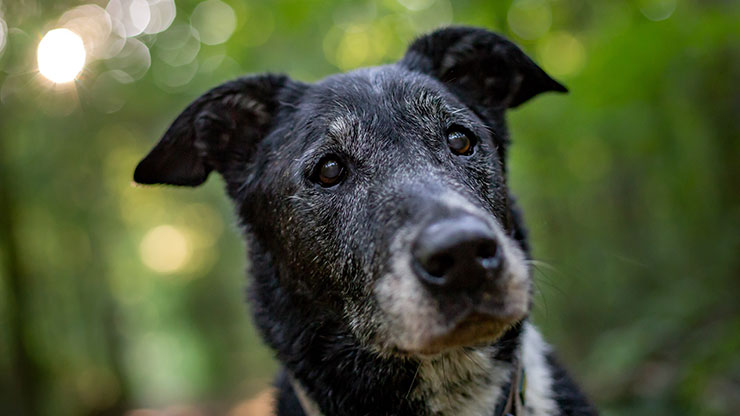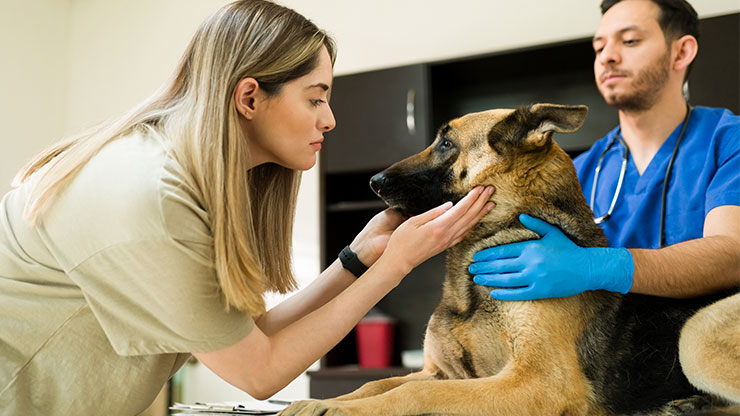
7 Changes to Expect as Your Dog Gets Older
Just as human bodies change as we age, so too do the bodies of our four-legged friends. As a responsible pet parent, it’s important to know what these changes are so you can be better prepared to manage your dog’s health as they get older.
When is Your Dog Considered a Senior?
Despite what you probably learned growing up, dogs do not age seven years for every human year. Instead, the rate of aging is based on the size of your dog. So, if you want to know if your dog is a senior yet and in need of extra care, use the guide below:
- Under 20 lbs: Senior at 7-10 years old
- 21-50 lbs: Senior at 7 years old
- Over 51 lbs: Senior at 5-6 years old
If you aren’t sure about your dog's weight, you can simply estimate. Most dogs, on average, are considered seniors between the ages of seven and ten.
7 Changes You Can Expect As Your Dog Gets Older and How to Manage Them
It is perfectly natural for your dog’s mental and physical health to change as they get older. So, here’s a list of changes you can expect as your dog ages and tips on how to manage these changes to help them live more comfortably as a senior dog.

1. Lower Energy Levels
Lower energy levels and reduced activity are common signs that your fur pal is getting older. This doesn’t mean they can’t or shouldn’t exercise anymore, but you will need to potentially take shorter walks and not run them as hard, depending on how much their stamina seems to be affected.
It’s still important to keep your dog moving, though. Exercise and regular activity helps keep them strong and reduces their risk of illness and even disease. There are also lots of ways you can help boost your dog’s energy as they age, such as:
- Switching their diet to something more age-appropriate that helps them replenish lost nutrients
- Keeping their water fresh to ensure they are staying hydrated
- Giving them nutritional supplements
- Keeping them moving with age-appropriate exercise
2. Limited Mobility
In some cases, dogs will have lower energy levels because they are having mobility issues. Joint pain and inflammation, for example, are more common in dogs in their senior years, and this pain can make it hard for them to move around. Arthritis is actually very common in senior dogs.
If you think your furry friend is having joint pain or other potential mobility issues, get them checked out by their vet. There may be medications that can help, or you can even look into alternative care, like acupuncture or water therapy. There are also many supplements on the market that can help dogs with hip and joint pain.
3. Weight Changes
As your dog gets older, its metabolism changes, just as with humans. This can lead to weight gain or weight loss. Though this weight fluctuation is normal, it’s important to take steps to avoid extreme weight changes.
If your dog puts on too much weight, for example, it might need a diet change and more exercise. If they are losing too much weight, they might need more food or food with different ingredients. You should also check with your vet as well to make sure the weight changes aren’t due to an illness or disease.

4. Vision and Hearing Problems
Hearing problems and eye problems are also common in senior dogs. However, while some wear and tear is expected, significant loss of hearing or vision may be the result of a more serious problem, such as diabetes, retinal detachment, ocular hemorrhaging, or an ear infection.
If you only notice mild changes in vision and hearing, it’s likely nothing to be concerned about, but you should get your dog checked out if they experience more extreme changes. They could need medication or even surgery if the hearing or vision loss is due to a serious issue. Or, they might simply need something like ear drops or eye drops to help with allergies or an infection.
5. Increased Sensitivity to Temperature
As their bodily functions slow down, your dog may have a harder time regulating its body temperature. This means they can more easily get overheated in warm weather and can more easily get chilled in colder weather, which can lead to heatstroke or hypothermia.
Medically, there isn’t much that can be done about this, but you can take measures to keep them more comfortable. To keep your dog warm, you can dress them in a dog sweater, provide them with a heated bed, give them blankets to cuddle under, and avoid keeping them outside in cold weather for extended periods.
To keep your pet cool when it’s hot outside, make sure they have plenty of water, provide them with shaded areas to rest, use a cooling bed or a fan where they like to lay down, give them frozen treats, keep them inside more often, and trim their fur if they have a thick coat.
6. Bad Breath
Dogs can experience tooth decay and gum disease more easily as they age, which can lead to bad breath. Periodontal disease, for example, is a common dental issue dogs experience as they get older.
You can avoid dental issues and bad breath by getting your dog’s teeth cleaned by a professional and having bad teeth removed, brushing their teeth regularly at home, and using dental treats and chew toys that can help clear the tartar away.

7. Increase in Illness and Disease
Of course, the older your dog gets, the more susceptible they become to illness and disease, such as kidney disease, cancer, disc disease, and more. This is also a natural part of aging.
However, keeping your pet vaccinated and taking them in for regular wellness exams are the best things you can do for your dog’s health. Not all illnesses and diseases can be avoided, but the more you keep up with their exams, the more likely you are to catch something early or even be able to prevent some health issues.
Wrapping Up
No one likes to get old. Even our pets can struggle with aging. The difference is they can’t as easily communicate with us to tell us what’s bothering them. That’s why it’s important to know what changes they could be going through and how to take care of them.
And when in doubt, always check in with your vet. Regular vet visits can keep your pets healthier and prevent them from developing more serious issues down the road.










